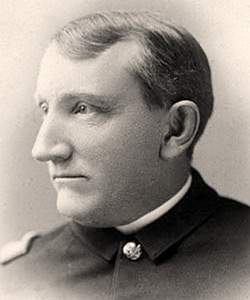Richard Henry Pratt (American Antiquarian Society)
Reference
It is not an undertaking so great as to strain the resources of our government to take the thirty thousand or thereabout Indian children of school age and scatter them among the schools of the United States, thus freeing them from the tribal relations and influences, and, having provided for their education, let them shift for themselves as laborers, craftsmen or in other walks of life according to their tastes and opportunities. The experiment of the Indian school at Carlisle, Pennsylvania, under the charge of Captain Pratt, whose humanity and sense of justice and honor are unquestionable, but not more so than his
practical wisdom and the success which has rewarded his efforts within the scope of his authority and opportunity, — is conclusive evidence that this policy is practicable. Anyone who has seen a group of Apache children as they arrived at Carlisle, with all the characteristics of the savage, not only in their dress and manner, but visibly stamped upon their features in hard lines of craft, ferocity, suspicion
and sullen obduracy, and has also seen a year later the same children neatly dressed, with their frank intelligent faces, not noticeably unlike in expression those of wholesome and happy boys and girls of our own race, must be convinced that education under suitable conditions is the true solution of the Indian.
practical wisdom and the success which has rewarded his efforts within the scope of his authority and opportunity, — is conclusive evidence that this policy is practicable. Anyone who has seen a group of Apache children as they arrived at Carlisle, with all the characteristics of the savage, not only in their dress and manner, but visibly stamped upon their features in hard lines of craft, ferocity, suspicion
and sullen obduracy, and has also seen a year later the same children neatly dressed, with their frank intelligent faces, not noticeably unlike in expression those of wholesome and happy boys and girls of our own race, must be convinced that education under suitable conditions is the true solution of the Indian.
Proceedings of the American Antiquarian Society, vol. 11 (Worcester,MA: Charles Hamilton Press, 1898), 39-40.
Richard Henry Pratt (Columbia Encyclopedia)
Reference
Pratt, Richard Henry
1840–1924, American soldier and educator, b. Rushford, N.Y. He served in the Union army during the Civil War and then in the Indian wars in the West, where he became interested in the cultural problems of the Native Americans. He experimented in educating Native Americans, believing that they must be taught to reject tribal culture and adapt to white society. In 1879, he founded at Carlisle, Pa., a nonreservation school for Native Americans. He retired from the U.S. army in 1903 but supervised the Carlisle Indian School, maintained by the U.S. government and housed in an army barracks, until 1904.
1840–1924, American soldier and educator, b. Rushford, N.Y. He served in the Union army during the Civil War and then in the Indian wars in the West, where he became interested in the cultural problems of the Native Americans. He experimented in educating Native Americans, believing that they must be taught to reject tribal culture and adapt to white society. In 1879, he founded at Carlisle, Pa., a nonreservation school for Native Americans. He retired from the U.S. army in 1903 but supervised the Carlisle Indian School, maintained by the U.S. government and housed in an army barracks, until 1904.
Columbia Encyclopedia, 6th ed., s.v. “Pratt, Richard Henry.”
Richard Henry Pratt (Who's Who in America)
Reference
PRATT, Richard Henry, army officer; b. Rushford, N.Y., Dec. 6, 1840; s. Richard S. and Mary Herrick P.; ed. Logansport, Ind.: m.; Delphi, Ind., Apr. 12, 1864, Anna L. Mason. Served in Ind. vols., corp. to capt., 1861-5. Apptd. in regular army 2d lt. 10th cav., Man. 7, 1867; 1st lt. July 31, 1867; capt. Feb. 17, 1883; maj. 1st cav. July 1, 1898; transferred to 10th cav. Aug. 2, 1899; lt.-col. 14th cav. Feb. 2, 1901; transferred to 15th cav. Mar. 7, 1901; col. Feb., 1903, and retired Feb. 17, 1903. Suggested and organized the Industrial Sch. for Indians in 1879 and was its only supt. to Feb., 1903; resigned. Address: Carlisle, Pa.
John W. Leonard, ed., “Pratt, Richard Henry,” Who’s Who in America (Chicago: A.N. Marquis & Company, 1903), 1193.
Richard Henry Pratt (Handbook of Texas)
Scholarship
He applied for a commission in the regular army and on March 7, 1867, was appointed second lieutenant in the newly organized Tenth United States Cavalry, composed of black enlisted men with white officers. At Fort Arbuckle, Indian Territory, Pratt was promoted to first lieutenant on July 31. He began his long association with the American Indian when Lt. Col. John W. Davidson, the district commander, placed him in charge of the regiment's Indian scouts. Pratt took part in the Washita campaign of 1868 and over the next several years saw duty at Fort Sill and Camp Supply, as his unit sought to maintain order on the government Indian reservations. In the spring of 1873 he was transferred to Fort Griffin, in Texas, where he was given command of the Tonkawa scouts in addition to his Tenth Cavalry troop. Even as he participated in efforts to curb Comanche and Kiowa depredations and stop the illicit whiskey trade, his interest in and understanding of the Indians deepened. When the Red River War broke out, Pratt and his Tonkawa contingent accompanied Davidson's column into the Texas Panhandle in September and October 1874. In early November he was among those who pursued Grey Beard's scattered Cheyenne warriors for ninety-six miles to the Canadian River in what is now Potter County with Capt. Charles D. Vielé's command before weary mounts and icy weather forced the column back to Fort Sill.
H. Allen Anderson, “Pratt, Richard Henry,” The Handbook of Texas Online, http://www.tshaonline.org/handbook/online/articles/PP/fpr33.html.





